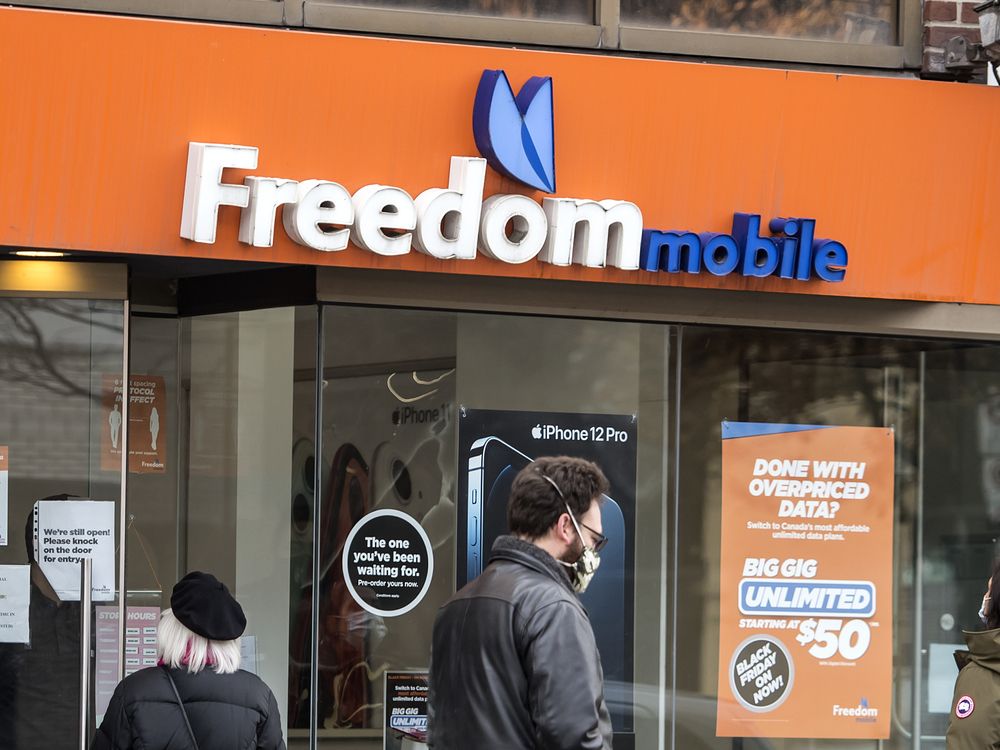Rogers, Shaw make deal to sell Freedom Mobile to Quebecor for $2.85B in hopes of getting merger approval

Rogers and Shaw struck a blockbuster merger agreement last year, but it has been delayed after the Competition Bureau concluded the combined company would reduce wireless competition and raise prices

Article content
Rogers Communications Inc. and Shaw Communications Inc. have struck a deal to sell Shaw’s Freedom Mobile wireless operation to Montreal based Quebecor Inc. in a bid to push through their $26-billion merger, which has been held up by Competition Bureau concerns that the combination of the two telecom giants will reduce wireless competition and raise prices.
Advertisement 2
Story continues below
Article content
The $2.85 billion Freedom transaction, announced late Friday, is subject to regulatory approval
“The Freedom Transaction will ensure the presence of a strong and sustainable fourth wireless carrier across Canada,” the companies said in a statement.
“The parties strongly believe the agreement effectively addresses the concerns raised by the Commissioner of Competition and the Minister of Innovation, Science and Industry regarding viable and sustainable wireless competition in Canada.”
Under the terms of the Divestiture Agreement, Quebecor has agreed to buy Freedom on a cash-free, debt-free basis at an enterprise value of $2.85 billion, expanding Quebecor’s wireless operations nationally, beyond its stronghold in Quebec.
Advertisement 3
Story continues below
Article content
The divestiture agreement includes the sale of all of Freedom branded wireless and internet customers as well as all of Freedom’s infrastructure, spectrum and retail locations. It also includes a long-term undertaking by Shaw and Rogers to provide Quebecor transport services (including backhaul and backbone) and roaming services.
The companies said they “will work expeditiously and in good faith to finalize definitive documentation.”
-

Competition Bureau doubles down on objections to Rogers deal for Shaw
-
Rogers asks tribunal to scrap Canada competition bureau’s rejection of Shaw takeover
“We strongly believe the divestiture will meet the Government of Canada’s objective of a strong and sustainable fourth wireless services provider,” Tony Staffieri, chief executive of Rogers, said in a statement. “This agreement between proven cable and wireless companies will ensure the continuation of a highly competitive market with robust future investments in Canada’s world class networks.”
Advertisement 4
Story continues below
Article content
Rogers and Shaw struck their blockbuster merger agreement last year, but the planned closing was pushed until the end of July after the federal Competition Bureau concluded the combination of the two telecom giants would reduce wireless competition and raise prices, and sought a full block of the deal.
In documents filed with the Competition Tribunal, the anti-trust authority argued that a “remedy” Rogers had proposed in the spring to sell Shaw’s wireless assets did not do enough to address those competition concerns. That view was reiterated Friday in a filing made public by the tribunal, in which Competition Bureau officials also argued that the claimed efficiencies of the combination are not enough to offset its anti-competitive effects because they are “speculative, unproven and unlikely to be achieved in whole or in part or are grossly exaggerated.”
Advertisement 5
Story continues below
Article content
Freedom Mobile has been sought after by a handful of suitors since March, when it became clear federal authorities pushing for greater competition weren’t prepared to accept the “wholesale transfer” of Shaw’s wireless assets to Rogers.
The chief executives of Montreal-based telecom giant Quebecor Inc. and Toronto-based independent Globalive have been vocal about their interest in acquiring Shaw’s Freedom Mobile division, which analysts said could fetch as much as $4 billion. Pierre Karl Péladeau and Anthony Lacavera have also been critical of the sale process run by Rogers, which initially excluded both parties.
Péladeau, chief executive of Quebecor, said the deal marks “a turning point for the Canadian wireless market. He said his company’s subsidiary Videotron is already a strong fourth wireless competition in Quebec, which “coupled with Freedom’s solid footprint in Ontario and Western Canada, can deliver concrete benefits” in British Columbia, Alberta, and Ontario.
Advertisement 6
Story continues below
Article content
“After fifteen years of growth in the Quebec wireless market, we have demonstrated our expertise, our ability to innovate and our financial strength,” Péladeau said.
Some telecom analysts viewed Quebecor, which has established a competitive wireless offering in Quebec, as a clear favourite for the federal government. That view gained traction when the Competition Bureau indicated that it felt “bundling” wireless with other telecommunication services such as internet and home phone could help ensure well-funded companies capable of increasing wireless competition.
While the names of the would-be buyers in the “remedy” sale the Competition Bureau deemed unsuitable were blacked out in filings with the tribunal, it is understood that Rogers had planned to sell Shaw’s Freedom Mobile wireless assets to New Brunswick-based rural internet service provider and mobile network operator Xplornet Communications Inc and Aquilini Investment Group.
Advertisement 7
Story continues below
Article content
Xplornet is owned by New York-based private equity firm Stonepeak Infrastructure Partners, while the Aquilini family owns assets including the Vancouver Canucks and the Rogers Arena in Vancouver where the NHL team plays.
The merger of Rogers and Shaw has been approved by the Canadian Radio-television and Telecommunications Commission (CRTC) and Shaw shareholders, but still requires the approval of competition authorities as well as Innovation, Science and Economic Development Canada.
The Competition Tribunal has scheduled hearings to begin Nov. 7 and last at least four weeks, followed by written and oral arguments.
Advertisement
Story continues below






